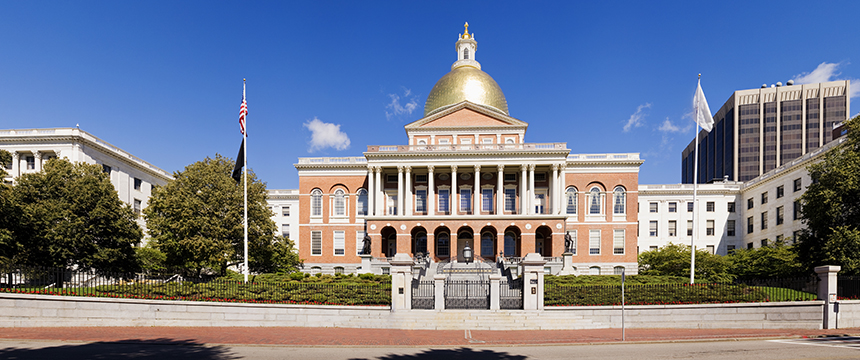
For more than three months now, qualifying Massachusetts employees have been eligible for medical and family leave benefits under the Massachusetts Paid Family and Medical Leave (PFML) Act. As employers build out their PFML compliance programs and receive employees’ PFML applications, many new questions and scenarios continue to arise. This blog post sheds light on some of these practical issues, including insight from the Department itself.
As explained in prior posts, Massachusetts workers facing a health crisis, bonding with a child, or caring for a sick relative may take up to 26 weeks of paid, job-protected leave pursuant to PFML. These benefits are available either through the Massachusetts Department of Family and Medical Leave (the “Department”), the state agency charged with administering and enforcing the PFML, or through employers’ state-approved private plans.
Since January, the Department has hosted a number of virtual “Town Halls” aimed at answering questions from both employers and employees. In these Town Halls, the Department candidly acknowledged that the state has experienced a high volume of applications, and that workers have faced delays in receiving benefits. Part of the delay was attributed to the failure of some employers to register a “leave administrator” with the Department. Employers who have not already registered a leave administrator are encouraged to do so as soon as possible.
The Department further explained what the application process looks like in practice:
- Employers will receive an email letting them know that an employee at their company has begun an application for PFML.
- Employers are instructed to view the application details and to respond within 10 business days.
- An employer may be asked to confirm, among other things: whether the employee has taken any leave during the past benefit year; the employee’s work patterns, hours, and wages; and whether the employer suspects potential fraud.
The Department also answered a number of questions from attendees. The following may be of particular interest to employers:
- Do employers risk violating HIPAA by requesting medical information in connection with PFML applications?
- No. Drawing parallels to the federal Family and Medical Leave Act (FMLA) application process, the Department explained that it researched this issue and determined that employers do not violate HIPAA by collecting PFML applications.
- No. Drawing parallels to the federal Family and Medical Leave Act (FMLA) application process, the Department explained that it researched this issue and determined that employers do not violate HIPAA by collecting PFML applications.
- If an employee gave birth and took parental leave in 2020, can they still use PFML?
- Yes. PFML benefits were not available prior to January 1, 2021.Anyone covered under the law is entitled to such benefits, as long as the leave is taken within 12 months of a child’s arrival.
- Yes. PFML benefits were not available prior to January 1, 2021.Anyone covered under the law is entitled to such benefits, as long as the leave is taken within 12 months of a child’s arrival.
- Are employees able to split up the 12-week bonding period? For example, provided leave is taken within 12 months of the child’s arrival, can an employee use four weeks, go back to work for a few weeks, and then use the remaining leave allotment later?
- An employee may only take intermittent bonding leave with permission from their employer.(Please see answer to Question 13 below for information on other types of intermittent leave.)
- An employee may only take intermittent bonding leave with permission from their employer.(Please see answer to Question 13 below for information on other types of intermittent leave.)
- Can an employee use paid time off (PTO) and receive PFML benefits at the same time?
- No. Employees are not eligible for PFML benefits if they are receiving their full wages from an employer-provided PTO program.
- No. Employees are not eligible for PFML benefits if they are receiving their full wages from an employer-provided PTO program.
- Does use of PTO reduce the allotment of PFML leave available? For example, if an employee first takes three weeks of PTO from the company to bond with a child, do they only get nine weeks of bonding leave under PFML?
- Yes. The qualifying condition is what matters for purposes of PFML. As such, use of PTO for a covered reason will count against an employee’s annual allotment of PFML leave.
- Yes. The qualifying condition is what matters for purposes of PFML. As such, use of PTO for a covered reason will count against an employee’s annual allotment of PFML leave.
- Are former employees eligible to take PFML?
- Yes. Former employees, defined as employees that have been separated from the employer for less than 26 weeks and that met the financial eligibility requirements at the time of separation, are also eligible for up to 26 weeks of PFML leave. Please note that PFML benefits will be offset by any unemployment insurance benefits the former employee receives.
- Yes. Former employees, defined as employees that have been separated from the employer for less than 26 weeks and that met the financial eligibility requirements at the time of separation, are also eligible for up to 26 weeks of PFML leave. Please note that PFML benefits will be offset by any unemployment insurance benefits the former employee receives.
- Is illness related to COVID-19 considered a serious medical condition within the meaning of the statute?
- As with other medical conditions, whether sickness from COVID-19 is a “serious medical condition” depends on whether an employee obtains the appropriate certification. A positive test result is not enough, in and of itself, to qualify for leave.
In addition to the questions addressed at the Department’s Town Hall, below are additional FAQs that we are seeing as employers navigate the PFML landscape.
- Can employers require that employees use accrued PTO prior to using PFML leave?
- No. An employer may not compel an employee to exhaust rights to any sick, vacation, or other PTO prior to taking PFML leave. It may, however, allow an employee to do so.
- No. An employer may not compel an employee to exhaust rights to any sick, vacation, or other PTO prior to taking PFML leave. It may, however, allow an employee to do so.
- How does an unlimited PTO policy interact with PFML?
- Employers with unlimited PTO policies may specify in their policies that unlimited PTO cannot be used for a leave of absence. The unlimited PTO plan would therefore not impact PFML leave. Additionally, under PFML, the first seven days of leave are considered an initial waiting period, and benefits are not paid by the Department. If an employer wants to compensate its employees for this seven-day waiting period, it may include that in its PFML policy, but employers should refer to that payment as “wage-replacement benefits” or “supplemental benefits” rather than designate such payment as use of unlimited PTO.
- Employers with unlimited PTO policies may specify in their policies that unlimited PTO cannot be used for a leave of absence. The unlimited PTO plan would therefore not impact PFML leave. Additionally, under PFML, the first seven days of leave are considered an initial waiting period, and benefits are not paid by the Department. If an employer wants to compensate its employees for this seven-day waiting period, it may include that in its PFML policy, but employers should refer to that payment as “wage-replacement benefits” or “supplemental benefits” rather than designate such payment as use of unlimited PTO.
- Can employers require employees to exhaust PFML benefits before using additional employer-provided family, medical, or temporary disability benefits?
- Yes. An employer may require that PFML leave benefits run concurrently with benefits or leave allowed under the terms of an employer’s temporary disability or family/parental leave policy. Any PFML policy should explicitly state this condition.
- Yes. An employer may require that PFML leave benefits run concurrently with benefits or leave allowed under the terms of an employer’s temporary disability or family/parental leave policy. Any PFML policy should explicitly state this condition.
- May employers provide additional family, medical, or temporary disability leave benefits on top of PFML benefits?
- Yes. Employers may “top up” employees such that they receive benefits greater than those that would be available through PFML leave alone. For example, PFML entitles an employee bonding with a new child up to 12 weeks of leave and partial (50-80%) wage replacement. If an employer seeks to offer 18 weeks of leave and full wage replacement, it may pay the employee additional wage replacement benefits on top of the PFML benefits for the first 12 weeks, and then may elect to pay the employee their full salary for the remaining six weeks after PFML benefits have been exhausted.
- Yes. Employers may “top up” employees such that they receive benefits greater than those that would be available through PFML leave alone. For example, PFML entitles an employee bonding with a new child up to 12 weeks of leave and partial (50-80%) wage replacement. If an employer seeks to offer 18 weeks of leave and full wage replacement, it may pay the employee additional wage replacement benefits on top of the PFML benefits for the first 12 weeks, and then may elect to pay the employee their full salary for the remaining six weeks after PFML benefits have been exhausted.
- Are new mothers entitled to both medical leave and bonding leave after giving birth?
- Yes. An employee may take PFML medical leave during pregnancy or recovery from childbirth that is immediately followed by PFML family bonding leave. However, the request for medical leave must be supported by documentation from a health care provider.
- Yes. An employee may take PFML medical leave during pregnancy or recovery from childbirth that is immediately followed by PFML family bonding leave. However, the request for medical leave must be supported by documentation from a health care provider.
- Are employers required to allow employees to take PFML on an intermittent or reduced leave schedule?
- The answer to this question depends on what type of leave the employee is taking:
- PFML Family Leave:
- An employee that has taken PFML family leave to bond with a child may take intermittent leave only if the employer agrees to the schedule.
- An employee that has taken PFML family leave to care for a relative may take leave intermittently if a health care provider deems it medically necessary.
- An employee that has taken PFML family leave due to a qualifying exigency related to a family member’s active duty may take leave intermittently.
- PFML Medical Leave:
- An employee that has taken PFML medical leave due to their own serious health condition may take intermittent leave if medically necessary.
- PFML Family Leave:
- What happens in the event an employee does not return from PFML leave?
- Because employers are obligated to continue providing health care coverage to employees while they are on PFML leave, employers have been asking whether they may require an employee that does not return to work to repay the cost of health benefits provided during the leave. At this time, this is neither expressly permitted nor prohibited by the statutes and regulations. Any employer who incorporates such language into its PFML policy should stay informed about any changes to the PFML statute and regulations.
For additional information about Massachusetts Paid Family and Medical Leave, or about paid family and medical leave requirements in any state, please reach out to your Foley & Lardner LLP Labor & Employment attorney.

